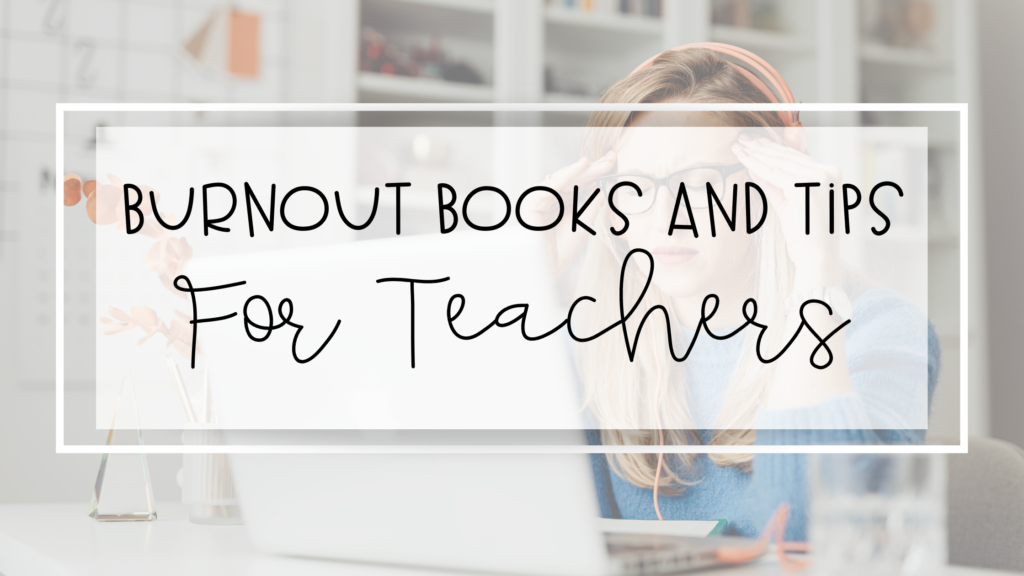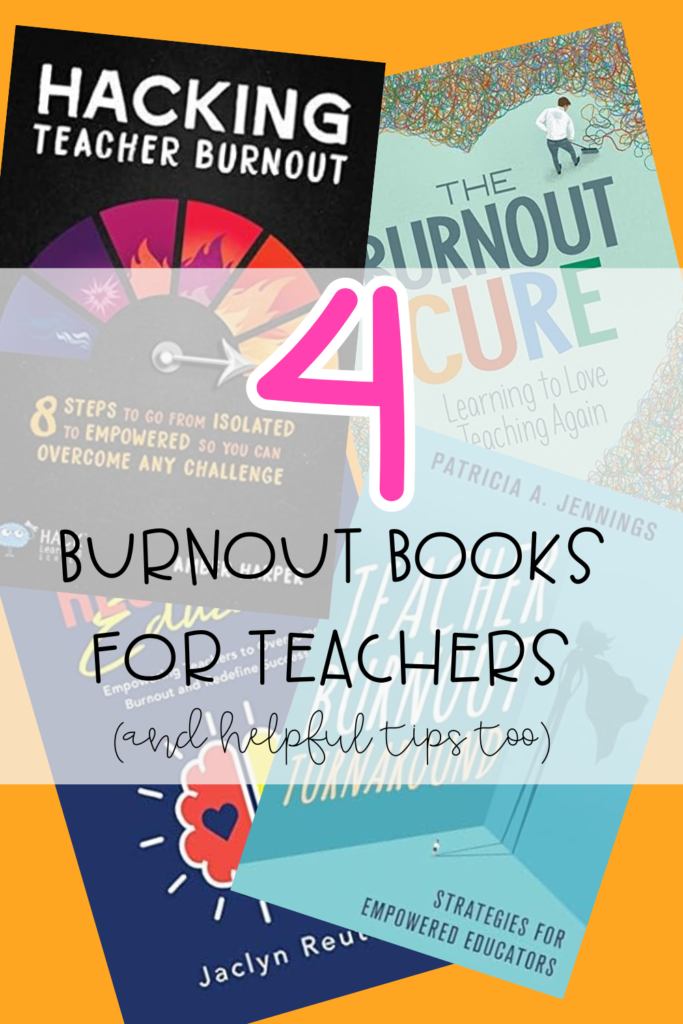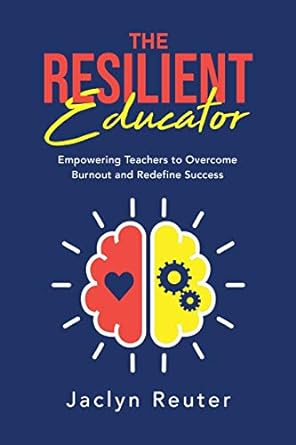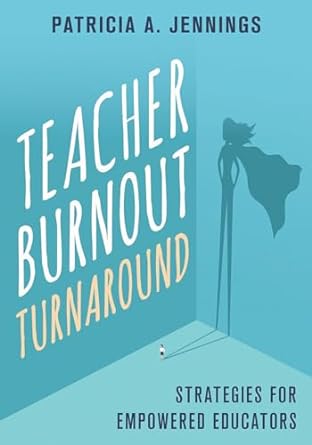Helpful Tips and Best Books on Burnout For Teachers
Let’s talk about something that’s been buzzing around the teacher’s lounge and by teacher’s lounge, I mean social media: burnout. We’ve all felt that overwhelming sense of exhaustion and disillusionment creeping up on us at one point or another. It can be scary to feel done with it all when there are at least 2-3 months left for many. So what do you do? How do you handle it all? Although there are many ways to recharge, one thing I have found helpful is finding a new “burnout book” and just sitting down and reading. Yes, if you can believe it, teacher burnout is quite a popular topic nowadays. So, within this post, I’ll recommend some of the best books on burnout for teachers. But, we’ll also look at other ways to get your groove back and not feel so exhausted, overworked, and overwhelmed.

What is Teacher Burnout?
Teacher burnout is more than just feeling tired or stressed—it’s a state of emotional, physical, and mental exhaustion that comes from prolonged exposure to chronic stress. It’s that feeling of being completely physically and emotionally drained and struggling to find joy or fulfillment in your work.

Why Does Teacher Burnout Happen?
Teacher burnout happens for various reasons, each contributing to overwhelming exhaustion and disappointment. One major factor is the excessive workload and pressure placed on teachers to perform at their best day in and day out. Teachers often juggle numerous responsibilities with limited time and resources. Yes, teachers are used to planning and executing engaging lessons, grading assignments, and managing classroom dynamics. But now we’re also social workers, counselors, tutors, and so much more. This constant demand can lead to feelings of overwhelm and burnout as the sheer volume of tasks becomes too much to handle.
Another common cause of teacher burnout is the lack of support from administration or colleagues. Teachers rely on a network of support to get through the challenges of their profession, but when that support is lacking, it can feel like we’re fighting an uphill battle alone.
Additionally, unrealistic expectations and societal pressures significantly affect teacher burnout. In today’s world, there seems to be a perception that teachers should be able to do it all – excel in their professional roles, maintain a perfect work-life balance, and meet the needs of every student. This unrealistic expectation can make many of us start to feel inadequate and full of self-doubt.
Finally, feeling undervalued or unappreciated in the teaching profession can also contribute to burnout. Despite their critical role in shaping future generations, we often find ourselves underpaid, overworked, and underappreciated. This lack of recognition can affect their emotional well-being and motivation, leading to burnout over time.
How to Avoid Teacher Burnout
Feeling burnt out is like hitting a wall – you’re exhausted, emotionally drained, and lacking motivation. No, reading one of the best books on burnout is not going to fix the problem instantly. Although, it will help! There are many other ways to recharge and reignite your passion for teaching! Here are some strategies to help you manage burnout and find that inner peace:
Prioritize Self-Care: Take time for yourself daily, whether you decide to exercise, meditate, or simply indulge in your favorite hobbies. It’s important to make sure your cup is full because you can’t pour from an empty cup.
Set Boundaries: Learn to say no to extra tasks or commitments that don’t align with your priorities or values. It’s okay to put yourself first sometimes. Skip the committee if it’ll take away your planning, leave at your contract hours, and close your laptop during lunch. Set the boundaries many teachers struggle to make.
Seek Support: If you’re struggling, reach out to colleagues, friends, or a mental health professional. You don’t have to go through burnout alone. I’m here for you, too!
Practice Mindfulness: Stay present in the moment and practice gratitude for the good things in your life. Mindfulness can help reduce stress and improve overall well-being.
Invest in Professional Development: Take advantage of opportunities for growth and learning in your field. Continuing education can help you stay engaged and motivated in your work. Read some of the best books on burnout for teachers from the list below. 😉
Best Books on Burnout for Teachers
Teaching can be tough, and sometimes, we all need a little extra support to keep our passion alive and find that work-life balance. That’s where these awesome books come in. They’re packed with super helpful tips, real-life stories, and down-to-earth advice to help you beat burnout. Plus, rediscover your love for teaching, and create a life that’s as fulfilling outside the classroom as it is inside. Let’s get that spark back!
The Burn Out Cure by Chase Mielke
Award-winning teacher Chase Mielke shares insights from his own research, lesson plans, and personal experiences with burnout to help you flip the script, boost your determination to excel as a teacher and rekindle your deep love for education.
With a blend of humor and solid grounding in research on social-emotional learning and positive psychology, The Burnout Cure offers practical strategies for shifting your mindset, attitudes, and actions to bring about meaningful change for both you and your students. From mindfulness and empathy to gratitude and acts of kindness, this book provides actionable steps to incorporate into your daily routine and share with your students through engaging classroom activities. Armed with these tools, teachers can unlock their full potential and bring out the best in their students, creating a positive ripple effect in their learning journey.
The Resilient Educator by Jaclyn Reuter
Reuter shares her personal journey from burnout to resilience, offering guidance for educators seeking to reignite their passion for teaching. Suitable for both new teachers and seasoned educators, Reuter’s book provides practical steps to combat burnout and cultivate a thriving teaching career. Through small mindset shifts, readers will discover the power of productivity, the importance of resilience in education, and the value of living their vocation. As teachers, we’ve found our true calling, and This book serves as a beacon of hope, helping educators reconnect with their love for teaching and recommit to their classrooms with renewed vigor.
Hacking Teacher Burnout by Amber Harper
In Hacking Teacher Burnout, experienced classroom teacher, podcast host, and Google trainer Amber Harper presents an eight-step roadmap to help educators navigate through burnout and emerge as empowered, fulfilled, and effective teachers. Through practical strategies and actionable steps, this book aims to transform the feeling of burnout into a sense of fulfillment, happiness, efficiency, and effectiveness in both the classroom and everyday life.
Teacher Burnout Turnaround by Patricia A. Jennings
In her book, educational psychologist Tish Jennings introduces a framework highlighting the various stressors contributing to burnout among educators. She provides insights on how teachers can address these stressors at different levels, offering strategies to mitigate their impact. From fostering social and emotional skills crucial for teachers and students to advocating for systemic changes that promote collective efficacy, Jennings offers practical solutions to counteract burnout in education. Through her work, she instills hope and empowers educators with tools to navigate and overcome the challenges they face in their profession.
Teacher burnout is a very real obstacle in today’s world, but it’s not an impossible goal to overcome. By recognizing the warning signs, seeking support, and implementing practical strategies for self-care, we can reclaim our joy and become the best versions of ourselves both in and out of the classroom. Remember, you are not alone in this journey; there is hope for a brighter, more fulfilling future ahead. So take a deep breath, put down that to-do list for a moment, read one of the best books on burnout for teachers, and remember to prioritize your own well-being. You deserve it!





